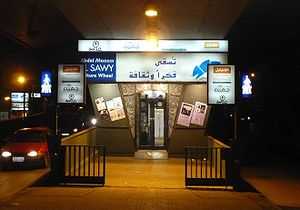El Sawy Culture wheel

El Sawy culturewheel (Arabic: ساقية الصاوى) (transliterated: Sakkiat Al-Sawy) is an all-purpose, private cultural center, located on Gezira Island in the Zamalek district, central Cairo, Egypt. It is considered one of the most important cultural venues in Egypt.[1] According to Aljazeera, the center gets more than 20000 visitors monthly and its website receives approximately 150000 visitors/month.[2]
History
El Sawy culturewheel was established in 2003 by Engineer Mohamed El-Sawy. Prior to its construction, its location, beneath the 15th May Bridge in Zamalek, was a garbage dump and a shelter for homeless people and drug addicts.[3] El-Sawy named his center in honor of his father's — Abdel Moneim El-Sawy, an Egyptian novelist and a former minister of culture — five-part novel series: "El-Sakkia" or (The Wheel).[4]
Locations and halls
As of April 2009, El Sawy culturewheel has 3 branches: the main branch in Zamalek, a branch in Algeel Algadeed school and a temporary branch in Qena. The main branch has 8 halls: Wisdom hall, River hall, Earth hall, Word halls 1 and 2, Garden Hall, El Naseeb and Bostan El Nil.[5] The permanent premises in Qena is scheduled for opening in Ramadan, 2009.[6]
Activities
The center is home for a wide range of activities and cultural events. Every year, it chooses a main theme for most of its events, the 2009 theme is "dignity", through which it aims to abolish some social problems, such as begging.[1] The center has organized hundreds of concerts and musical events, including those for oud, jazz, musical theatre, children chorus and performances for several Egyptian and Arab bands, singers and entertainers.[1] It also hosts several seminars, workshops, art exhibitions, book fairs and movie shows.[1]
Being the first non-government controlled private cultural center in Egypt, its events are claimed to have more freedom and higher quality than those in government-controlled centers.[7] In addition, it organizes a number of conferences and festivals, including an annual theatre festival,[8] the "Sakkia animated film festival",[9] El Sawy culture wheel festival for documentaries,[10] and the El Sakkia conference for Arabic language and Poet Laureate Ahmed Shawqi. There is also a lecture series about Ancient Egypt by Egyptologist Ahmed Seddik.
The Sawy also includes several sections for arts and music training and a number of libraries, including a music library and children's library.[2] and it offers several art classes in painting, sculpture, piano and violin for children and youth.[4]
References
- ↑ 1.0 1.1 1.2 1.3 "El Sawy Culturewheel in Egypt: From a place for beggars to a resort for intellectuals" (in Arabic). CNN. 2009-03-17. Retrieved 2009-04-01.
- ↑ 2.0 2.1 "El Sawy Culturewheel in Egypt chooses minds as a focus for its 2008 activities" (in Arabic). Aljazeera. 2008-01-07. Retrieved 2009-04-01.
- ↑ "Many reasons for one visit". Al Ahram Weekly. 2008-09-25. Retrieved 2009-04-01.
- ↑ 4.0 4.1 "Inventing the Wheel". Egypt Today. 2004-10. Retrieved 2009-04-01. Check date values in:
|date=(help) - ↑ From the Culturewheel website
- ↑ "Cornerstone for El Sawy culturewheel in Qena laid" (in Arabic). Al-badeel Newspaper. 2009-04-01. Retrieved 2009-04-01.
- ↑ "Popularizing Art and Culture: An Egyptian experience". islamOnline. 2006-09-04. Retrieved 2009-04-01.
- ↑ "23 independent theatre groups in El Sawy culturewheel festival in Cairo" (in Arabic). Aljazeera. 2008-08-12. Retrieved 2009-04-01.
- ↑ "83 movies in Sakkia's first animated film festival in Cairo" (in Arabic). Aljazeera. 2008-12-24. Retrieved 2009-04-01.
- ↑ "Presenting El Sawy culturewheel documentary film festival awards" (in Arabic). Aljazeera. 2006-07-20. Retrieved 2009-04-01.
External links
Coordinates: 30°03′44.2″N 31°12′59.1″E / 30.062278°N 31.216417°E